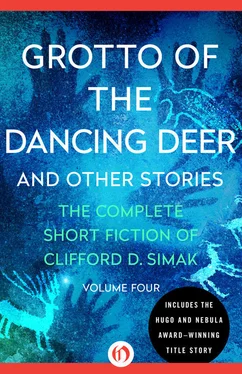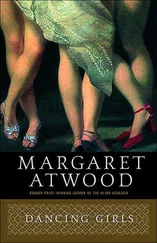“Somehow,” said Packard, “I don’t like what you done to Blade. He was an O.K. hombre.”
“Tell you the truth,” confessed Hurley, “I’d just as soon it had been someone else. Can think of a couple I would rather it had been. Blade was the one … But you ain’t told me your plans.”
“I haven’t any plans.”
“Look, kid, you can’t fool me. You can’t—”
Packard leaned over from his horse. “Are you riding along or not?” he snapped.
“Oh, sure. Sure, I’m riding along.”
Hurley tied Blade’s mount to one of the pines, got up on his own, trotted up the trail. Packard urged his horse to follow.
Packard’s stomach was a leaden knot of disgust as he watched Hurley’s swaying form.
So this was the way it was, he told himself. You gunned down your own friends, you broke faith with your own gang, you did anything that put your groping fingers into a sack of gold. You had no honor and you walked with your back hunched against a bullet that might come from a man that you called a friend, because in this business there were no such things as friends … just other men that you watched, wondering if the day would come when they killed you or you killed them for an ounce or two of gold, a roll of bills, for anything at all.
Even Preacher Page!
The moon climbed higher and from some far ledge a wolf howled lonesomely. An owl swooped down over Packard’s head, a bulleting soundlessness that floated through the night. Little things scuttered and scampered along the rocky trail.
Their horses turned a sharp bend in the trail and in a pocketed valley a tiny fire was burning.
Hurley turned his head. “That’s the camp,” he said.
Packard nodded.
“How about it, kid?” asked Hurley. “Got anything to tell me?”
“Not a thing,” said Packard.
And his mind thought: I can’t trust you, Hurley. How do I know you’re on the up and up? How can I be sure that Randall didn’t plan it all just to sound me out? If I talked to you, really told you what I had in mind, you might pay me off with a bullet in the head.
But Hurley had played square with Page, hadn’t peeped to Randall about who the Preacher was. And it would have been worth a lot to Randall to have known that, with Page threatening to bring in martial law. It would have given Randall a club that would have either silenced Page or sent him scuttling out of town.
That was the hell of it, Packard told himself. You never could be sure.
The men were waiting around the fire when they arrived. Hard-faced men who stared at them for a long moment without speaking.
Finally one of them strode forward.
“Howdy,” he said. “New man?”
Hurley chuckled. “That’s right, Pinky. A new one that Randall wants us to break in. Name of Packard. Steve Packard’s kid.”
A smile split Pinky’s face.
“Ought to be all right,” he said, “if he’s anything like his old man.”
He walked toward Packard, hand held out. “Name is Traynor, Packard. But the boys all call me Pinky.”
Packard shook his hand.
“Meet the boys,” said Pinky. “This old hombre is Pop Allen. And the one over there is Marks. The fellow by the fire is Sylvester. Hell of a name, ain’t it?”
For a single instant Sylvester’s left eye flashed, picking up and reflecting the flare of the campfire … and there was something about the man’s face that rang bells of recognition in Packard’s brain … a haunting recollection that sent his thoughts scurrying back along the last few days.
The cheeks were flat and the lips were tight, but there was an angle to the chin and the way the hair swept back from his forehead that seemed to fit in with some other face back in Hangman’s Gulch.
Then Sylvester was saying: “Howdy, Packard,” and stepping forward with his hand held out, a chubby hand that did not seem to be made to fit a six-gun grip.
And Packard, gripping Sylvester’s hand, stared at the left eye which no longer glinted.
Suddenly he knew Sylvester, his mind filling in the face as he had seen it before … a face with some sort of plastic material worked into the cheeks and in front of the gums to puff out the cheeks and lips, to distort the face so that once the silly little mustache had been pasted on no one would ever recognize the man.
He spoke low, lips scarcely moving, so that no one else might hear.
“I see,” he told Sylvester, “that you found your eye.”
Chapter V
WE DON’T WASTE LEAD!
From far down the canyon came the faint clatter of wheels, the muffled clop of horses’ hoofs.
Crouched in the clump of juniper beside the trail, Packard stared out across the rock-ribbed cleft that climbed, twisting deep into the mountain range.
Again came the far-off squeal of wheels and Packard, straining his ears, tensed, then relaxed again. Eyes narrowed against the morning sun, he took stock of the situation.
Pinky was across the trail, almost opposite where Packard crouched in the juniper. Marks was farther up. Sylvester and Hurley were between himself and Marks, each on their own side of the trail. Pop Allen was back in the little side canyon, a quarter mile away, holding the horses.
The four of them, Pinky had told them, were to let the stagecoach pass, were to remain out of sight until Marks stepped out and fired a shot, the first one over the driver’s head, the second one in his head if he made a hostile move.
Sylvester was to cover the shotgun messenger up on the seat beside the driver, with Hurley to back him up. Packard and Pinky were to take care of other guards, if there should happen to be any. There probably would be, Pinky had said … up on the roof.
Packard felt perspiration trickling down his face behind the blue handkerchief which served him for a mask.
He was nervous, he told himself, somewhat surprised. And he shouldn’t be nervous. Never had there been a time when he needed the rock-hard sureness of hand and eye that he might need in the next few minutes.
The chance he waited, he knew would come in that first moment of swift action when Marks stepped out into the trail and flung up his gun.
Cautiously, Packard squinted up the trail, trying to make out the positions of the others. He knew where they should be but there was nothing to betray them. No single flutter of a wind-blown handkerchief, no hint of color in the tangled shrubs, no stirring bush.
Hurley would be up there somewhere. Hurley, who had shot down Blade when the man wasn’t even looking and thus dealt himself a hand. Hurley, he knew, would be watching him, waiting for the sign that would send him into action. Hurley was no fool. Hurley knew there was something in the wind, probably was more than a little nettled that the son of his old friend and trail partner hadn’t let him in on it.
And yet, Packard told himself, he couldn’t have let him in on it, for there wasn’t really anything … no well-defined plan, no thought-out course of action. Just a hunch that a chance would come, waiting for the break that would give him the upper hand. And when it came there’d be no time for thinking, no time for planning … he’d have to act by what would amount to instinct.
And there was Sylvester. Just where did Sylvester fit? The man had a glass eye, but one that was so perfect his companions of the owlhoot trail had never found it out. If they had he would bear a nickname that would have marked him as a man of certain distinction. That eye would have furnished more than one jibe, more than one good-natured joke, more than one tall tale.
If Sylvester was a bona-fide member of the Canyon gang, why should he have been in Hangman’s Gulch, tricked out with facial disguise and checkered suit? And even if he did want to promenade around without anyone knowing who he was, why all that ridiculous hoorah about losing his glass eye? A thing like that wouldn’t accomplish a single thing except attract attention to him.
Читать дальше












